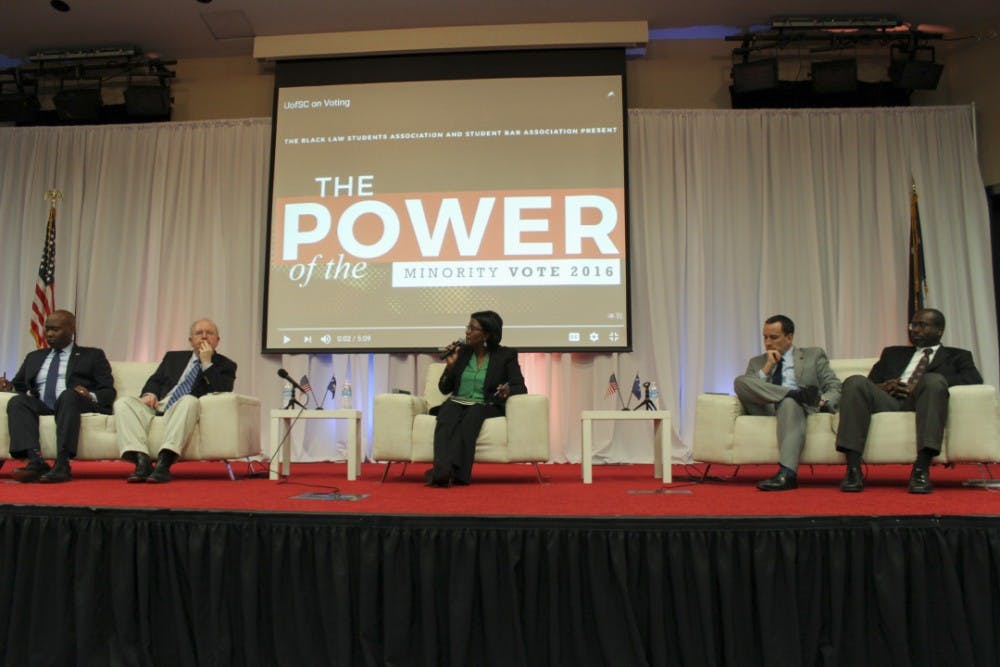South Carolina state party chairs, politicians and professors discussed the importance of voter turnout at a forum about the power of the minority vote on Tuesday night. All student were encouraged to cast their votes, especially in an election as dividing as the current one. The discussion focused on the significance of individual votes, the media's role in campaigns and the importance of collaboration and compromise between political parties.
"Minority voters have a voice. They have a role to play in America," said Jaime Harrison, chairman of the South Carolina Democratic Party.
Harrison addressed the significance that minority votes have in shaping election outcomes. He stated that, for the first time in history, in 2012 African-American voter turnout was greater than white voter turnout.
Harrison recognized the historical importance of the minority vote for the Democratic Party, specifically for democratic President Barack Obama's win in 2008.
Travis Bain, third-year law student and vice president of the Student Bar Association, stated that it is important for voter turnout to be the same as it was in 2008 and 2012 among minorities, particularly minority youth. He added that people who do not vote do not have a say in or a place to complain about the outcome of the election.
"Good, bad or ugly, get out and vote," Bain said.
Matt Moore, chairman of the South Carolina State Republican Party, said neither the Democratic nor the Republican Party should take the minority vote for granted. He said that the majority of people in the country under 20 are minorities — which, according to Moore, is not something either party should be afraid of.
"It's something that we should embrace by electing people of all different backgrounds and colors to represent the best of what America has to offer," Moore said.
Former Columbia Mayor Bob Coble stated that one of the biggest problems in modern America's political system is that the parties do not collaborate effectively, and he spoke highly of Moore and Harrison's civil relationship as chairmen of opposing parties.
Harrison commented that although he goes to the Democratic National Convention while Moore goes to the Republican National Convention, they share "the common goal of trying to get things done for the American people." He added that compromises must be made in politics and that there is not much effective discussion that leads to compromise in Washington.
Moore spoke about the effects that negative advertisements in the media about a candidate have on voter decisions, which, according to him, is a technique that unfortunately still works.
"Fear and anger are two of the most base human emotions," Moore said.
Moore added that it is hard to have a winning campaign about hope instead of fear or anger and mentioned that few presidential candidates in the past have successfully used hope as a campaign strategy.
First-year law student Aaron Greene attributed voter shift to third parties partly to the media's lack of objective reporting and an absence of preferable candidates in the two main parties. He said the fact that voters are voting for third party candidates is a good thing because it shows that people are engaged and paying attention to the election cycle.
"It's so biased you can't get a clear viewpoint," Greene said about media coverage.
Jameson Sackey, a third-year law student and chief of staff of the Black Law Students Association, said it is important for minority voters and all voters to utilize media literacy when considering the election cycle. He stated that it is hard obtain the truth through news stations and that for the past few decades news stations' primary function has not necessarily been to inform, but rather to gain viewership and boost ratings.
"They're going to give you what is gonna get you to watch," Sackey said.
Bain said that often the "in your face" satirical media, such as the content produced by Stephen Colbert and John Oliver, can appear more truthful than biased news stations because it is a reaction to what its creators perceive from the news world.
Christopher Mathis,the president of Black Law Students Association, spoke about the purpose of the event. He stressed that voting is a privilege, and that all citizens have the right to have their voice heard. He talked about the historical struggles and bloodshed that got minority voters to where they are today.
"Voting is the expression of our commitment to ourselves, one another, this country and this world," Mathis said.
The election takes place in less than a week on Tuesday, Nov. 8. All of the panelists said they will be relieved after the election is over.

